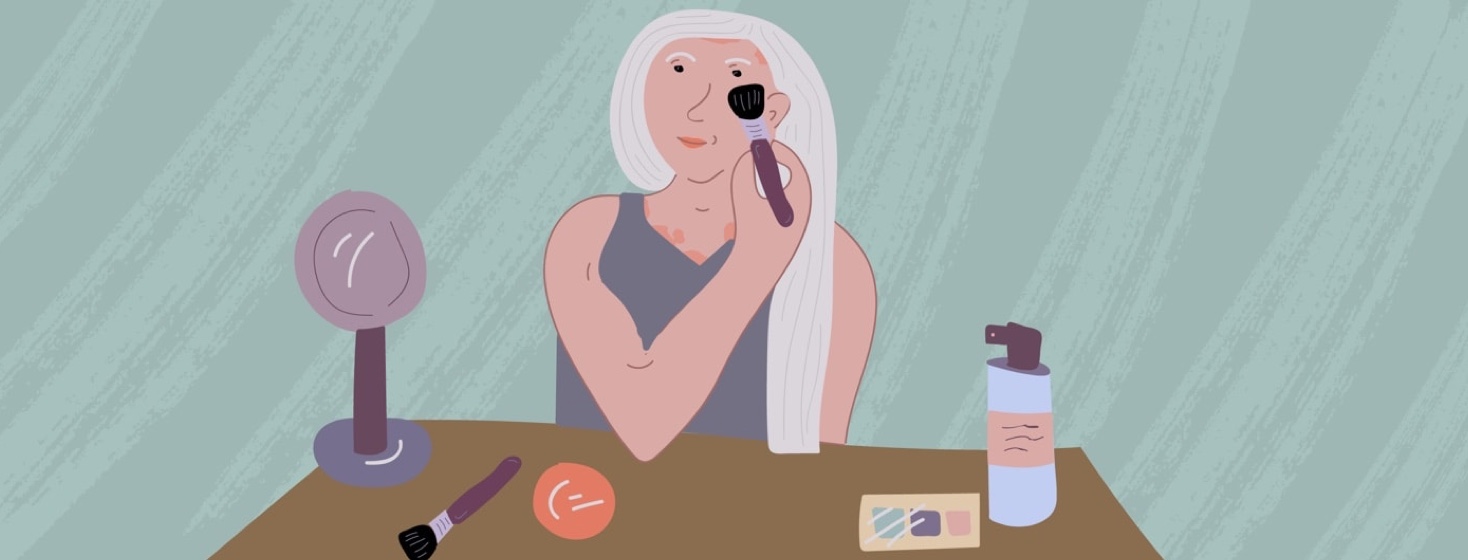Makeup and Macular Degeneration: Is It Safe?
Most of us with macular degeneration want nothing more than to protect our eyes at all costs. But, do we have to give up things like wearing makeup in order to do so?
Recently, I’ve noticed a lot of questions from our community members about the safety of wearing makeup while battling macular degeneration. Not everyone is a fan of makeup and it’s something they are willing to ‘give up’ easily. I happen to love makeup. I don’t wear a lot of it, but I do love to play around with it and I wear it while at work or going out somewhere special with loved ones.
What wearing makeup does for me
Makeup allows me to change my look daily if I want. It gives me confidence as well as helping to highlight my beautiful, giant baby blues. It...umm...also does wonders for hiding those pesky dark under-eye circles and wrinkles that I have from age and lack of sleep. Anyone else feeling me on this?
Hey, I may not have eyes that work as well as I’d like, but I do have beautiful eyes that I like to enhance with color and long lashes. Those of us who aren’t ready to give up makeup yet don’t have to as long as we’re careful about when we wear it and how.
Makeup hygiene
We all know that makeup eventually expires and needs to be replaced, but do any of us remember the ‘rules’ for this? First, it’s important to know that cosmetics have an expiration date or ‘best if used by’ date on their packaging. That is a great place to start when trying to determine how long they can be used. The expiration dates may be written really small. So if you struggle to read it, I’d recommend asking someone to help, and then write it down more clearly on the casing with a permanent marker.
Eye makeup expiration dates
Another important thing to note here is that cosmetics for the eyes have a faster expiration than cosmetics for other areas of the body. The United States Food and Drug Administration, or FDA, explains that “When makeup gets old, it starts to break down, and this can cause issues from irritation and inflammation to rashes, blisters, eye infections, and pink eye. In rare cases, women have been temporarily or permanently blinded by an eye cosmetic.”
Additional guidelines for for eye makeup
Here are some other guidelines to follow for replacing eye makeup in order to keep it hygienically safe.
According to the Mayo Clinic, makeup products are contaminated as soon as they’re opened. Once their seal is broken, the chemicals inside them start to break down. Outside sources like bacteria and our own personal Demodex mites, [or tiny mites that live in or near hair follicles of mammals], start to build up over time and can cause harm to a person’s skin, eyes, lips, and overall health.”
Suggestions for replacing cosmetics
Because of this, The Mayo Clinic suggests that makeup bags should be completely cleaned out no less than twice a year. This can get really expensive really quickly, so to combat this they also suggest buying less makeup at a time or use sample sizes if available. Mascara, eyeliner pencils, eye shadow powders and creams, and concealers used around the eyes are all especially important to replace at least every few months.
How often should makeup brushes be cleaned?
Because we are using and reusing brushes on our eyes and face multiple times, it is important to remember to clean them frequently. Our eyes are precious and it doesn’t take much bacteria to cause a problem or infection. The cleaner, the better.
How do you clean makeup brushes?
You can disinfect makeup brushes using cleaners specifically manufactured for this purpose or you can scrub and rinse them with soap and hot water. You should still completely replace your brushes and tools using the guidelines from the Mayo Clinic and FDA.
If you’ve had an eye infection
If you have any type of eye infection, such as pink eye, it’s important to not use makeup during your infection. Not only does this slow the healing process, but it also cross contaminates your makeup and makeup tools like brushes and eyelash curlers. You may need to throw out any mascara, eyeliner, or shadows used during an infection.
It’s equally important to clean and disinfect or replace all makeup brushes and tools after an infection in order to not reinfect your eyes. And, this is a biggie...never share cosmetics. This may be a good place to practice the art of saying no...even to friends and family members who mean well. How do you really know when someone's makeup and brushes are clean? (They probably aren't!)
Makeup after surgery
As with any after-surgery care, be sure to ask your doctor when it’s safe to wear makeup after the procedure. I also think that with this you should be extra cautious and when you are ready to start wearing it again, start with brand new cosmetics. This will help eliminate possible infection or other complications.
Fake eyelashes
Fake eyelashes can be worn by applying them with eyelash glue and even magnetic applicators these days. Use caution with these adhesives and be sure to follow instructions for using each product safely. Temporary lashes are just that...temporary. They should be removed and cleaned appropriately.
Just because our eyes and vision may be changing doesn't mean we have to give up the things we like. If you follow these guidelines and use common sense, you should be able to use makeup no problem!
Andrea Junge

Join the conversation